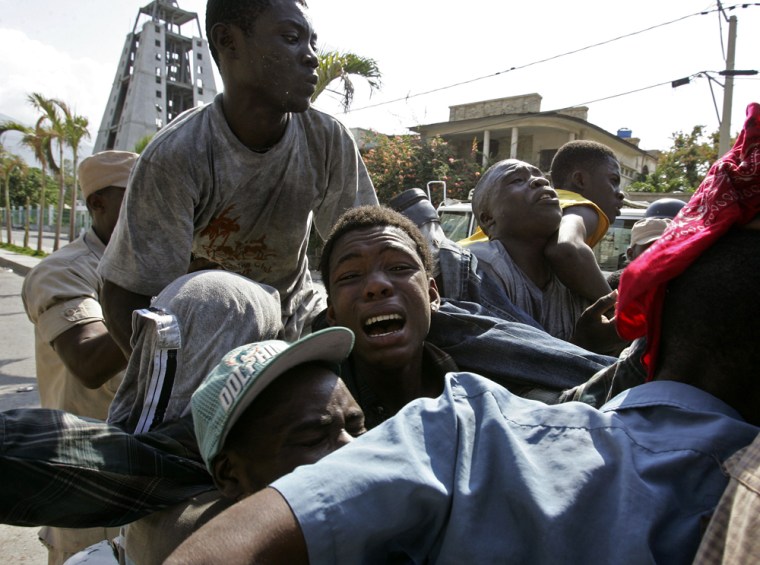A desperate appeal from the president Wednesday failed to restore order to Haiti's shattered capital, and bands of looters sacked stores, warehouses and government offices.
Gunfire rang out from the wealthy suburbs in the hills to the starving slums below as 9,000 U.N. peacekeepers were unable to halt a frenzy of looting and violence that has grown out of protests over rising food prices.
Many of the protesters are demanding the resignation of the U.S.-backed president, Rene Preval, and on Tuesday U.N. peacekeepers had to fire rubber bullets and tear gas to drive away a mob that tried to storm his palace.
He delivered his first public comments Wednesday, nearly a week into the protests. With his job on the line, Preval urged Congress to cut taxes on imported food and appealed to the rioters to go home.
"The solution is not to go around destroying stores," he said. "I'm giving you orders to stop."
But gunfire rang out around the palace after the speech, as peacekeepers tried to drive away people looting surrounding stores.
Mobs turn to looting
The streets remained in the control of bands of young men carrying sticks and rocks, who set up roadblocks of burning tires and stopped passing cars. Businesses were closed and most people locked themselves indoors, as mobs looted stores, warehouses and government offices.
Black smoke billowed over the city as protesters set tires ablaze. Sustained gunfire was heard throughout Petionville, where many diplomats and foreigners live, and in Martissant, a lawless slum west of downtown. On the road to the airport, groups of protesters surrounded makeshift barricades and threw rocks at passing cars.
Looters could be seen sacking a supermarket and several gas-station mini-marts. Radio stations reported looters also sacked a government rice warehouse outside Port-au-Prince and the office of Petionville's mayor.
Protests were reported Wednesday throughout Haiti. In the northern city of Cap-Haitien, bandits tried to steal food from the warehouse of the U.N. World Food Program, peacekeepers' spokeswoman Sophie Boutaud de la Combe said. Protesters also burned tires in Ouanaminthe, on the border with the Dominican Republic, and hundreds marched peacefully in the western port of St. Marc.
Haiti is particularly affected by food prices, which have risen 40 percent on average globally since mid-2007. With 80 percent of its population struggling to survive on less than $2 a day, the rising prices pose a real threat to its fragile democracy.
Preval acknowledged the threat in his address, saying Haiti's predicament comes partly from its dependence on imported rice that has weakened national production. He said the rising prices are a global phenomenon, and said the tax cut would help lessen the pain.
U.N. promises aid, food
U.N. Secretary-General Ban Ki-moon pledged Wednesday that his organization "will continue to support the Haitian authorities to bring emergency relief assistance to the Haitian people and to maintain public order," spokeswoman Marie Okabe said. He also called on donors to provide emergency aid.
U.N. police spokesman Fred Blaise said several people have been injured by bullets and rocks in the capital, including a Haitian police officer. Five people have been killed in the southern city of Les Cayes, where protesters tried to burn down the U.N. compound last week.
Many protesters want the United Nations to pull its peacekeepers from Haiti because of resentment over foreign presence. Anger has also been directed at the United States, which sent troops to Haiti in 2004 during the rebellion that ousted President Jean-Bertrand Aristide. On Tuesday, protesters threw rocks at the Canadian Embassy and at U.S. Embassy buildings.
The U.S. Embassy suspended operations Wednesday and advised Americans in Port-au-Prince and Les Cayes to remain indoors. Tim Aston, a U.S. Agency for International Development contractor in Port-au-Prince, said he and colleagues hadn't left their hotel in two days.
"You can hear gunfire and stuff like that," he said. "The helicopter is flying around and you see black smoke from the window."
Haiti's tourism industry all but ground to a halt more than a decade ago amid political violence. Cruise ships still dock in the heavily guarded peninsula of Labadee in northern Haiti, and operations were unaffected Wednesday, according to Royal Caribbean official John Weis.
Preval's speech had been widely anticipated, and his response to the violence could determine the future of his government.
Sen. Joseph Lambert, a member of Preval's party, said nobody should expect the president to "solve everything with a magic wand," adding that the protesters should listen to Preval's appeal for calm.
"If not," he said, "if there is an attempt at a coup d'etat to remove the president, things will get worse."
